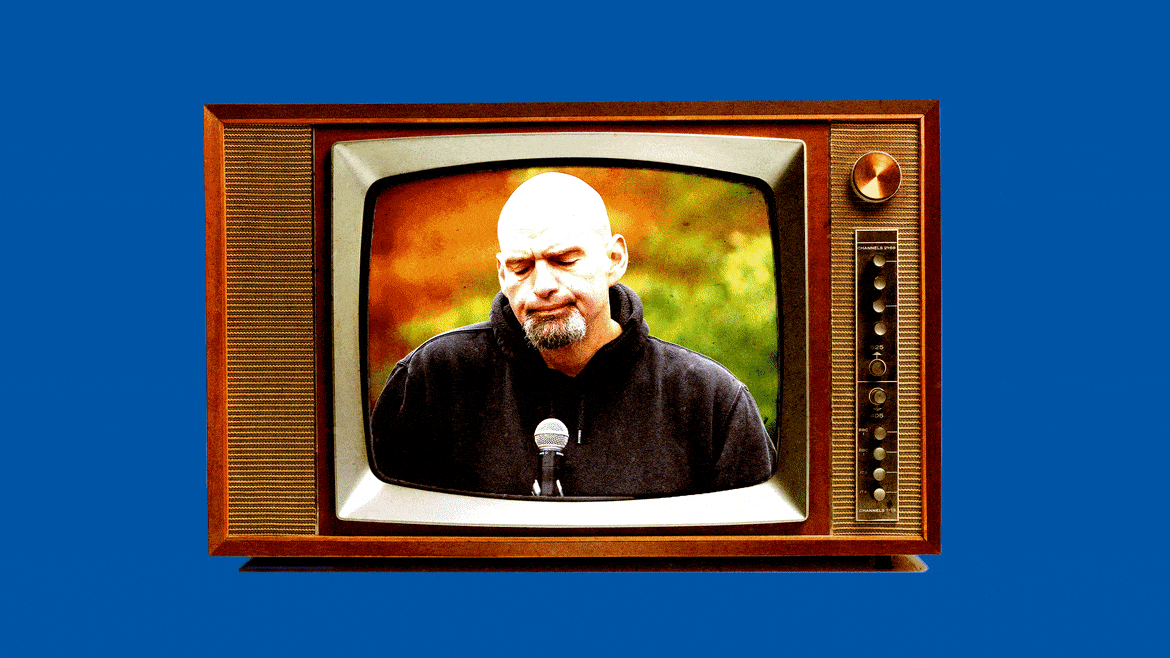John Fetterman’s Disaster Shows Why Debates Might Go Extinct

Wednesday night’s U.S. Senate debate in Pennsylvania raised even more concerns regarding John Fetterman’s health and fitness for office, but it also raised questions about the way we judge candidates.
Are political debates still a worthwhile exercise that give voters a better sense of the candidates and their policies, or are they a low-budget game show that rewards the best entertainer? Whatever the answer, the notion that debates are a sacrosanct part of American democracy is fading, and the candidates are voting with their feet.
In 2016, Donald Trump seemed to benefit from skipping a primary debate. In the 2022 general election, Trump skipped the second debate with Joe Biden after the Commission on Presidential Debates (CPD) announced that it would be virtual, due to his COVID-19 diagnosis.
John Fetterman’s Health Is Totally Fair Game in the Campaign
In April, Republicans pulled out of the non-partisan CPD, which has been sanctioning presidential debates since 1987. Since then, several Republican candidates have refused to debate their Democratic opponents, including Herschel Walker, who declined multiple invitations before finally agreeing to debate his opponent, Sen. Raphael Warnock.
Democrats have done the same thing—with the most prominent being Katie Hobbs refusing to debate Kari Lake for the Arizona governor’s race. “Unfortunately, debating a conspiracy theorist like Kari Lake–whose entire campaign platform is to cause enormous chaos and make Arizona the subject of national ridicule–would only lead to constant interruptions, pointless distractions, and childish name-calling,” Hobbs’ campaign manager said in a statement.
If Hobbs loses the election in a couple weeks, as she well might, many people will point to her ducking the debates as a reason. But her decision may actually be prudent, even if she loses. There’s no sense in losing an election, being humiliated, and having your opponent advance conspiracy theories that are only retroactively fact checked.
Another candidate has shied away from media attention, albeit for entirely different reasons. Fetterman has maintained a very low profile since his stroke on May 13, just before his primary election. Ultimately, his campaign felt compelled to participate in one debate that lasted just an hour and allowed him to use closed captioning. And even sympathetic viewers agreed, it didn’t go well.
Dr. Oz and John Fetterman: Two Rich Phonies Playing Populism
In the wake of his disastrous performance, we can debate the wisdom of Fetterman’s strategy. It is now plausible to say he would have been better off by skipping it and taking whatever lumps might have come his way. But a deeper question lingers: Did voters learn anything useful from watching the debate?
It seems clear that voters now have a better sense of Fetterman’s condition—and it ain’t good. Chalk one point for transparency. What isn’t clear is to what degree the skills generally required for winning a political debate—being quick-witted, thinking on your feet, landing snappy comebacks, having mental agility, etc.—are the same skills that make someone a good U.S. Senator.
Have we designed a system that is better designed than one more suited to electing a reality TV star? Don’t answer that.
Had Fetterman not suffered a stroke, it is entirely possible that he would have benefitted from this format. Fetterman might have employed his formerly sharp tongue and capitalized on the soundbite culture. Would that version of John Fetterman have made a better senator than his opponent, Mehmet Oz (a celebrity TV doctor)? I’m not sure.
Tulsi Gabbard Doesn’t Really Stand for Anything
Almost nobody built for today’s politics could excel in the kind of stemwinders that were required in the Lincoln-Douglas debates, where one candidate would begin by speaking for 60 minutes. In a sense, those debates were also geared toward entertainment—the kind of entertainment that existed before radio, TV, video games, or the internet.
Today’s debates are geared for our short attention span era, where audiences can only (at best) digest sound bites. We've known for a long time that these debates are media dog and pony shows (or professional wrestling matches); they’re rarely substantive. It’s all about optics, now. The best case scenario is that your opponent does worse than you.
Kari Lake Is Dangerous Enough to Get Elected President
Part of the problem may be that persuasion isn’t in fashion these days. So, to the extent that debates are even valuable, the primary goal is to come away with some “gotcha” video clips that can be used to fire up supporters. Dr. Oz certainly got a few of those clips last night. But can a leader’s character, ability, and knowledge be assessed in a viral tweet?
We may have reached a point where politicians will begin to skip or limit debates—and they will have a point. We are starting to normalize the idea that debates can be skipped, and candidates who want to skip a debate can now plausibly argue that these rituals are antiquated or silly. Once upon a time, breaking these norms would have been more costly. But then again, once upon a time, debates were more worthy of defending.
The question will likely be whether candidates can get away with it. We will know more about that in a couple of weeks. Regardless, there is a growing sense that debates, much like political conventions, have lost some of their shine. Maybe it’s time to rethink the way we assess a candidate’s fitness. The tradition of debates in American political races is dying. The question is whether anyone should mourn.
Get the Daily Beast's biggest scoops and scandals delivered right to your inbox. Sign up now.
Stay informed and gain unlimited access to the Daily Beast's unmatched reporting. Subscribe now.

 Yahoo News
Yahoo News 
